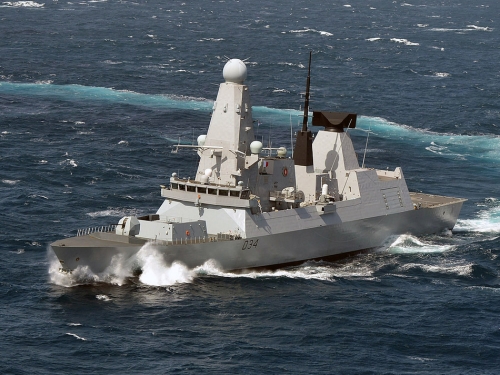
This article was originally published by European Geostrategy on 3 December, 2014. Republished with permission.
Maritime security is the new buzz-phrase in Brussels policy circles. 2014 has witnessed the publication of the EU’s first maritime security strategy. This strategy is premised upon the assumption that maritime security is a comprehensive business that covers a wide range of issues, from harbour safety, biodiversity conservation and the control of illegal fishing, through to piracy, all the way up to the support of crisis management operations. This emphasis on comprehensiveness is hardly surprising. The comprehensive approach is part of the European Union’s (EU) DNA, and it permeates through pretty much every instance of the newly adopted maritime security strategy.
Maritime security is the brainchild of the crisis management paradigm.
The North Atlantic Treaty Organisation’s (NATO) understanding of maritime security is quite similar to that of the EU. Admittedly, the Alliance lacks the kind of competencies the EU has in areas such as harbour safety, conservation or fishing. However, NATO’s Maritime Security Strategy places much emphasis on the fact that the sea’s status as a global common means that maritime security is a comprehensive business that can only be achieved through cooperation between military and civilian actors, between international organisations and partner nations.
As a concept, maritime security is a brainchild of the crisis management paradigm. This paradigm has been underpinned by Western global strategic and political supremacy, and has organised the way in which Americans and Europeans have thought about military power over the past twenty-five years. Crisis management has had a pervasive influence upon NATO debates since the end of the Cold War. And it has been central to the development of the Common Security and Defence Policy (CSDP), having come to organise the EU’s strategic culture, operational doctrine and approach to capability development for the better part of the last fifteen years.
Insofar as maritime security is concerned, the crisis management paradigm has animated the idea that Europeans (and Americans) could use the sea freely in order to transit into out of area operational theatres, where they could engage in crisis management and stabilisation missions. A related assumption was that the main challenges at sea came in the form of piracy, illegal immigration, drug smuggling, terrorism and so on, and could be overcome through cooperation with other International Organisation’s and multiple partners.
The crisis management paradigm seems to be in crisis.
The EU and NATO missions off the coast of Somalia represent the embodiment of ‘maritime security’. Those two operations amount to a coordinated anti-piracy effort involving multiple actors and organisations such as the EU, NATO, a number of Non-Governmental Organisations, private insurance companies as well as numerous non-EU, non-NATO countries like Australia, Saudi Arabia, India, Russia, Ukraine, China, Japan, South Korea or Indonesia.
International efforts to eradicate transnational challenges to maritime security are most welcome. However, it must not be forgotten that it is Western strategic supremacy at sea what provides the material and normative framework that allows these ‘crisis management’ initiatives to take hold. And the crisis management paradigm seems to be in crisis. The reasons behind this crisis are manifold, and include the return of great power competition (both in Europe and globally), intervention fatigue in the West, defence-budgetary pressures and the proliferation of Anti-Access Area Denial capabilities, which are being exported from China and Russia to countries like Pakistan, Iran, Syria or Algeria.
All these changes seem to be underpinning a recalibration in Western military strategy, as the intervention fever of the 1990s and 2000s draws down and greater attention is devoted to thinking about defence, deterrence, intelligence, prevention and military diplomacy. This does not mean that out of area operations are over. However, the kind of long-lasting and ambitious military and reconstruction efforts seen in the Western Balkans or Afghanistan will be generally avoided, and more ‘surgical’ forms of intervention will be prioritised.
Europeans should move from a ‘maritime security’ to a ‘seapower’ mindframe.
Insofar as maritime security is a concern, the unfolding crisis of crisis management heralds a transition into a less hospitable maritime environment for Europe and for the West. This means Europeans should perhaps move away from the assumption of unhindered Western access and freedom of movement at sea and think harder about how to help preserve Western supremacy at sea, and how to use the sea to project power in an increasingly contested maritime environment.
In other words, Europeans should move from a ‘maritime security’ to a ‘seapower’ mindframe. This means they should spend less time thinking about those kind of capabilities that assume unhindered access to and from the sea – such as sealift or offshore surface patrol – and a little more time thinking about sea-combat, underwater capabilities or air and missile defence at sea. More broadly, it means Europeans should move away from the notion of indiscriminate partnerships with every possible country and international organisation and focus more on those partners who have a strong stake in underpinning a rules-based order at sea. That includes first and foremost the United States, but also countries like Australia, India, Japan, Turkey or Brazil.
Professor Luis Simón is co-founder and a Senior Editor of European Geostrategy. He is also a Research Professor at the Institute for European Studies at the Free University of Brussels. He writes here in a personal capacity.
For more information on issues and events that shape our world, please visit ISN Security Watch or browse our resources.

